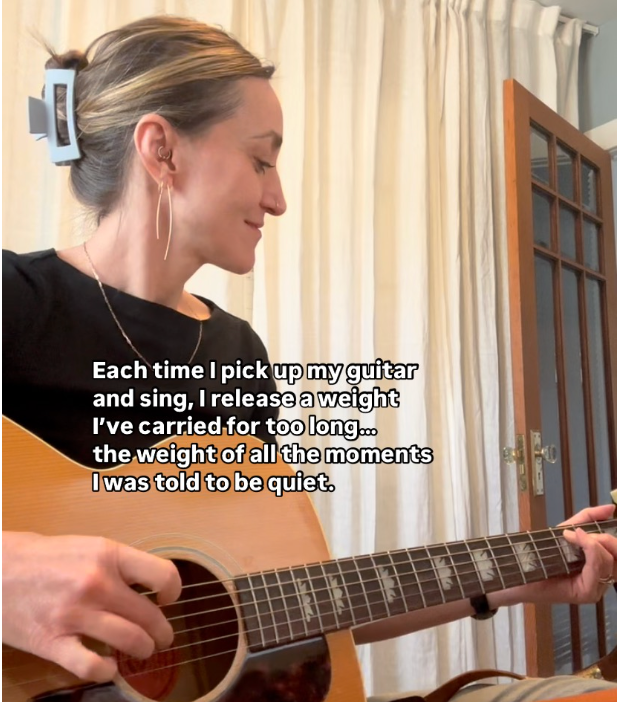
The Power of Devotion: A sanctuary for a free and resilient voice
When we look to great leaders of history we find examples like Martin Luther King Jr, Mahatma Ghandi, and Nelson Mandela. Each of these men led cultural revolutions based on ideas of love and shared humanity. They demonstrated their own strength of character by forgiving those who had wronged them, speaking up for what they believed, and strengthening human connections through compassion and understanding. Though their religious affiliations differed, each of these men found strength in their faith and lived their lives in devotion to what they believed was true.
Our ability to express a resilient voice rests in a depth of our self understating and shared connection to humanity. We can build resilience through devotion. This devotion need not be religious but to the unconditional acceptance of ourself and others. Through the integration of this acceptance we hear our own voice, explore what is possible, and ultimately find the courage and capacity to speak with clarity and resonance.
The Power of Acceptance
Many of us have experienced the power of being heard. When another is with us, listens, and is genuinely curious in what we have to say we discover layers in our own understanding. By having the freedom to express ourselves without filter we come to know our emotions, thoughts, and ideas more fully.
In the 1950s psychologist Carl Rogers coined the term unconditional positive regard (UPR) - basic acceptance and support of a person regardless of their behaviour/emotions/thoughts. Roger’s understood that individuals have an innate propensity to self understanding. When we receive UPR it allows us to separate our worth from our behaviour and develop self responsibility, esteem, and self acceptance. However, in many scenarios individuals are met with conditional positive regard in which they are only deemed acceptable if they meet certain standards of behaviour. Unfortunately, this creates cognitive dissonance when one’s lived experience is ousted the ‘acceptable’ zone. This dissonance leads to fragmented thinking, anxiety, and other mental health challenges all of which greatly impact our ability to express ourselves clearly and effectively.
We can mitigate the dissonance of conditional positive regard by creating a safe sanctuary for our voice - a place where we can express ourselves freely in devotion to self acceptance and a sense of something bigger then ourselves. The direction of this energy is personal, it may be spiritual or secular. The key is to connect with Unconditional positive regard and acceptance.
Devotion to Unconditional Acceptance
Devotion is a sense of love, loyalty, and enthusiasm for a person or activity. In the therapeutic relationship as outlined by Carl Rogers there are two examples of devotion; the therapist is devoted to unconditionally accepting their client and the client is devoted to working with the therapist. Thus devotion, as prescribed here, is a safe space where we can engage in free self expression towards that which unconditionally accepts us.
To clarify this relationship it helps to define what unconditional acceptance looks like to us personally. What does it feel like to experience unconditional acceptance? What entity carries this capacity? When have we felt it before?
We can define the unconditional in whatever way connects with us intellectually and viscerally.
- We might define it as spiritual - a divine entity or being that holds us in infinite acceptance
- We may define it as natural - a sense of connection and acceptance through nature or the universe
- We may define it as personal - A person or role model that has always made us feel accepted and loved.
Once we define the 'unconditional' for ourselves we can begin a devotional practice - free expression to that which accepts us fully.
Sing in Devotion
Singing is medicine and provides enormous benefits for our mental and physical health. Devotional singing is a unique vehicle for expression as it is not based in rational thought. Instead it connects with the right hemisphere or metaphoric mind. When we sing we express the raw material of our inner world without needing to understand what it means. Yet, through this expression we ground the nervous system and process emotions which often leads to deepened insight about ourself and our feelings.
In devotional singing there is no wrong note or unacceptable voice. All is welcome. Here we can give voice to those inner voices that have been silenced - our anger, our innocence, our passion are all welcome to express themselves. This sanctuary for expression allows these voices to be heard, felt, acknowledged, accepted, and perhaps even understood.
The songs we choose to sing in devotion are personal. Toning or singing a vowel sound can be just as powerful as offering a hymn or medicine song. Any song that allows us to express ourself freely and openly is perfect. (Hallelujah by Leonard Cohen and Feeling Good by Nina Simone are two fo my personal favourites)
Writing in Devotion
To write in devotion is to freely express our inner world onto the page (preferably by hand). It is a free space where we can say those things we felt we had to hide. Here we can share our feelings, our frustrations, even our most petty and judgemental thoughts. By allowing these expressions to be seen and accepted we also allow the expression of what lies beneath.
If you've ever practiced devotional writing you likely know the routine. At first it's awkward, sometimes we just begin by writing what is real in the moment "I'm here writing, I don't feel like it. I don't think there's really anything for me to say..." and then after a while, sometimes a page or two, more comes out. We find ourselves expressing how we feel about a certain situation or going through an experience detail by detail. In her book 'The Artist's Way' Julia Cameron insists on the prate of daily morning pages - three pages of writing every single day as a way to flush out our inner world.
If you are new to devotional writing we may begin with some simple prompts and follow Julia's advice - write for three pages no matter what and sees what happens. It takes time to build this relationship - just like it takes time for the client to open to their therapist but the results can be remarkable.
A Sanctuary for Voice
If we truly wish to express our voice with resilience and strength we must first develop a relationship with it, a place where all expression is met with acceptance and love. This does not mean that energy thought or emotion is factual truth, but that we are willing to experience these inner voices, to feel our inner landscape, and to allow ourself to rest and surrender in unconditional acceptance.
Over time what we discover is much what Carl Rogers understood - we are not our thoughts or emotions . Our value resides in our existence and our experiences and perceptions are malleable. As we come to allow all the aspects of our inner world to express themselves we come to understand the nature our being and connect to a deepened sense of self and human connection. It is here that we truly find resilience.
References
- Julia Cameron, 'The Artist's Way'
- Simply Psychology,
If you want to change the relationship to your voice & step more fully into your authentic communication book a free consultation & let's see if personal coaching is right for you!

About the Author
Amy Thiessen is an international teacher, coach, & musician who focuses on helping individuals connect to their confidence, purpose, & self esteem through voice & communication. Offering a holistic approach Amy helps individuals uncover & overcome their unique blocks around voice & communication, connect to their self esteem & purpose, & ultimately express themselves in a way that is empowered & impactful.
.webp)
Unlock the True Power of Your Voice
Your voice shapes how you connect, express, and make an impact. If you’ve ever held back, struggled to be heard, or wanted to communicate with more confidence and ease, somatic coaching can help.
Book a Consultation








